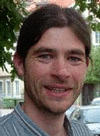
 Dr. Volker Barth
Dr. Volker Barth
Habilitationsprojekt
Environmental Numerical Modelling between Natural and Social Sciences
Recent approaches to model phenomena of global environmental change generally have had strong biases to the modelling traditions in either natural or social/economic science. These traditions are obstacles for interdisciplinary understanding and the development of integrated models. For example, all socio-economic models used for the IPCC reports to assess climatic change are based on neoclassical theory with its questionable assumptions of economic behaviour. On the other hand, results from natural science based models often remain ambiguous because the modellers refuse to specify the rationale behind the human activities modelled.
The project aims at a better representation of human behavior and social interactions in models for global (environmental) change. This shall mainly be established by developing numerical agent-based models of economic actors (individuals and/or firms) and combining them with the non-standard but more flexible and promising theory of evolutionary economics. Such models are bottom-up, inherently dynamic and allow for limited rationality and explicit indifference of agents. This is seen as an improvement compared to the standard homo oeconomicus approach using representative agents with complete rationality.
These models shall serve as tools in two directions of research:
- to better understand economic growth
- and to examine possible limitations to the growth process.
The focus on economic growth is due to its central role within the anthropogenic impact on the environment. Since the reasons for growth are until now only partially understood, the project shall contribute to this understanding by exploring usually neglected driving forces of growth (e.g., productivity growth and profit maximisation) and their interrelations. As a consequence of these considerations, the question whether there are limits to growth should be re-considered. It appears as if there are not only external limits but also limits from within the system, like the exclusion of growing parts of society from increasing consumption as the shear between rich and poor opens wider, which might result in a slowdown of demand growth.
Another focus will be on examining the possible representation of societal learning in models of global change. How can learning be conceptualized on a macro level beyond concepts like "learning curves"? And can environmental learning provide a powerful leverage to speed up necessary socio-economic transitions? Here, input from the GELENA project should be used to explore the capabilities of evolutionary models in this respect.